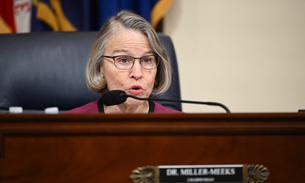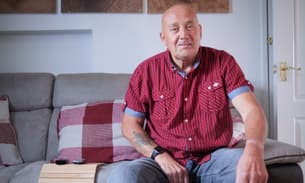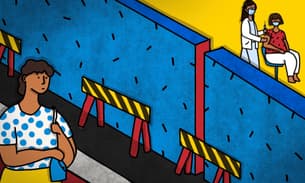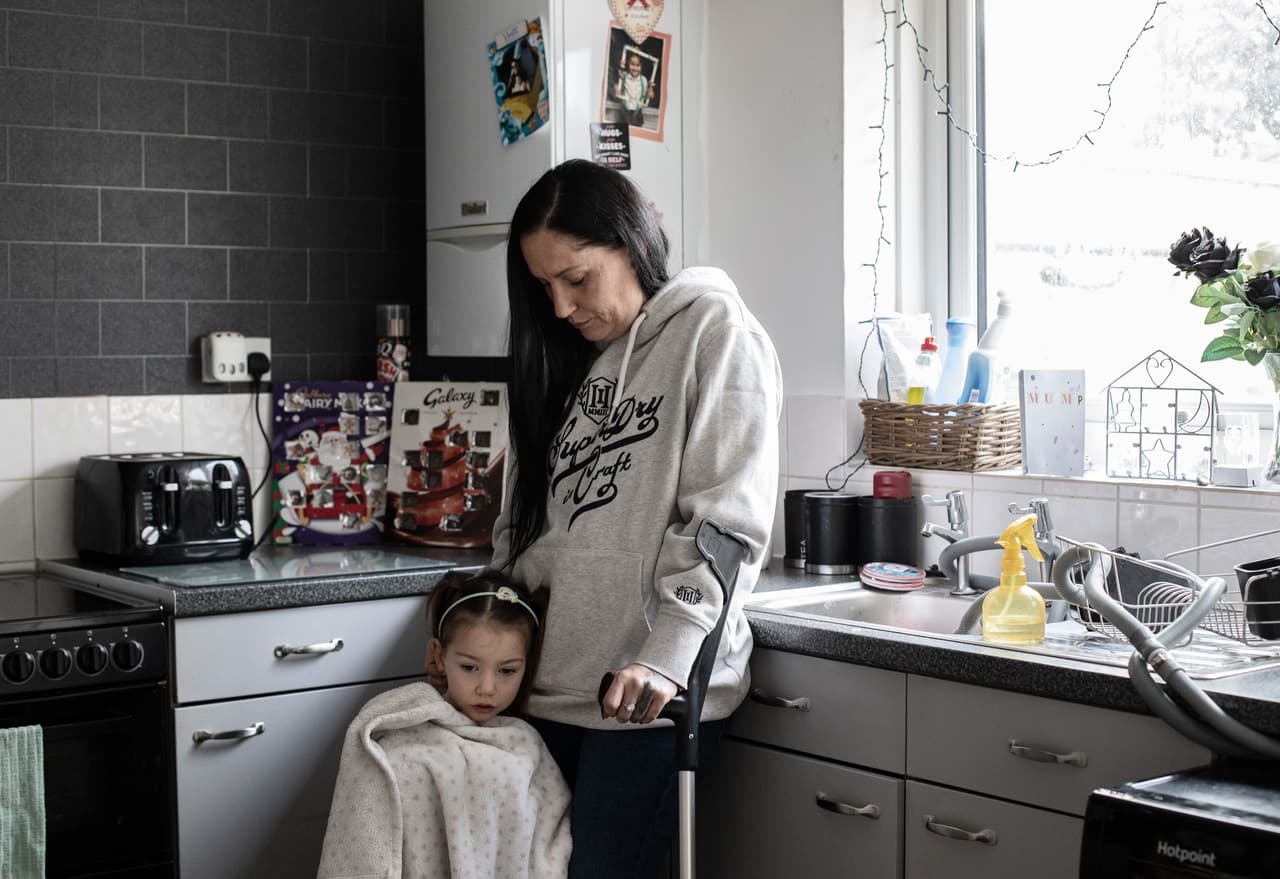
Thousands of vulnerable people cut off from gas and electricity for days at a time
Imagine pain so debilitating it “feels like your bones are being crushed on the inside every time you try to move or walk”. One misstep could jerk your hip from its socket or send you tumbling down the stairs as a leg crumbles underneath you. Arthritis locks up your joints. Imagine taking a warm shower for a short moment of relief, only to step out into the cold you’ve been living in for days on end, all because you can’t afford to top up your gas prepayment meter.
This is Gemma Carter’s life now. Poor health meant she had to stop working three years ago, but this year energy costs have risen to a level she couldn’t have prepared for as a disabled person. With two children at home to look after, and both her electricity and gas on prepayment meters, she regularly has to make difficult decisions: electricity or heating.
She is not alone. Exclusive data from Ofgem, the energy regulator, analysed by the Bureau of Investigative Journalism reveals that more than 50,000 people in Great Britain have gone without gas for more than a day at a time at the start of this year, with some staying cut off for as long as a month.
Figures were similarly stark for prepayment electricity meters: at least 37,000 people went without power for more than a day over the first three months of this year. The industry term for this situation, when a customer has no gas or electricity because the money on their prepayment meter runs out, is “self-disconnection”.
These are huge numbers – yet they are only a fraction of the full picture. Ofgem’s figures, provided to them by energy suppliers, only include smart pay-as-you-go meters, which at the start of the year were outnumbered across Great Britain by households using their older equivalents at a rate of two to one. Potentially hundreds of thousands more customers are being left with no choice other than to be without gas and electricity.
And despite Ofgem’s longstanding principles outlining how to protect vulnerable people, and requirements for suppliers to report key data, Ofgem is unable to say how many people with disabilities or life-limiting health conditions are being forced to live without heat or power.
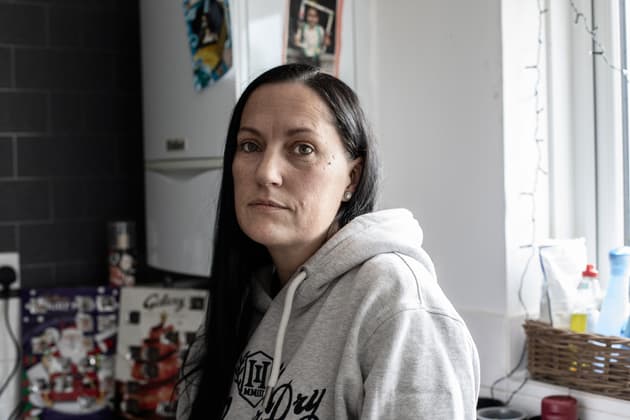 Gemma Carter has spent up to two-and-a-half weeks at a time without gas
Gavin Wallace for TBIJ
Gemma Carter has spent up to two-and-a-half weeks at a time without gas
Gavin Wallace for TBIJ
So far, the longest Gemma has gone without gas is two and a half weeks; without electricity it is two days. Since the summer, her payments for both utilities have quadrupled. Reading the sums of money aloud is heartbreaking, she said, and now she rarely gets out of the emergency reserve on either meter.
She said her energy usage has gone up a lot more since her health problems began. “I have to keep my back warm as well, so I have the heating on more than I should,” she says. “But if I don't, I physically can't move. It’s horrendous.” On the worst days, Gemma is confined to her bed and just turning over can cause her excruciating pain.
When Gemma first spoke to the Bureau, she predicted the £3 of emergency credit left on her gas meter would run out before she was due to receive any benefits, and it did. When we spoke again three days later, the money on her electric meter had also dipped into the emergency buffer with her next benefits payment still nearly two weeks away. The family spent a chunk of that weekend out of the house to preserve the credit.
“The electric’s not going to last at all,” she said. “There’s no way, especially when the little one is having accidents and I’m having to wash and dry things.” Gemma has cut down on using the tumble dryer and other electrical appliances to save money but it can feel like a false economy: “If the bedding is on the radiator, you don’t benefit from the heat.”
Items that were once lifelines are now liabilities. “I've got a dishwasher as well because I have trouble standing at the sink for a long amount of time,” she said, “but it's running the meter up.”
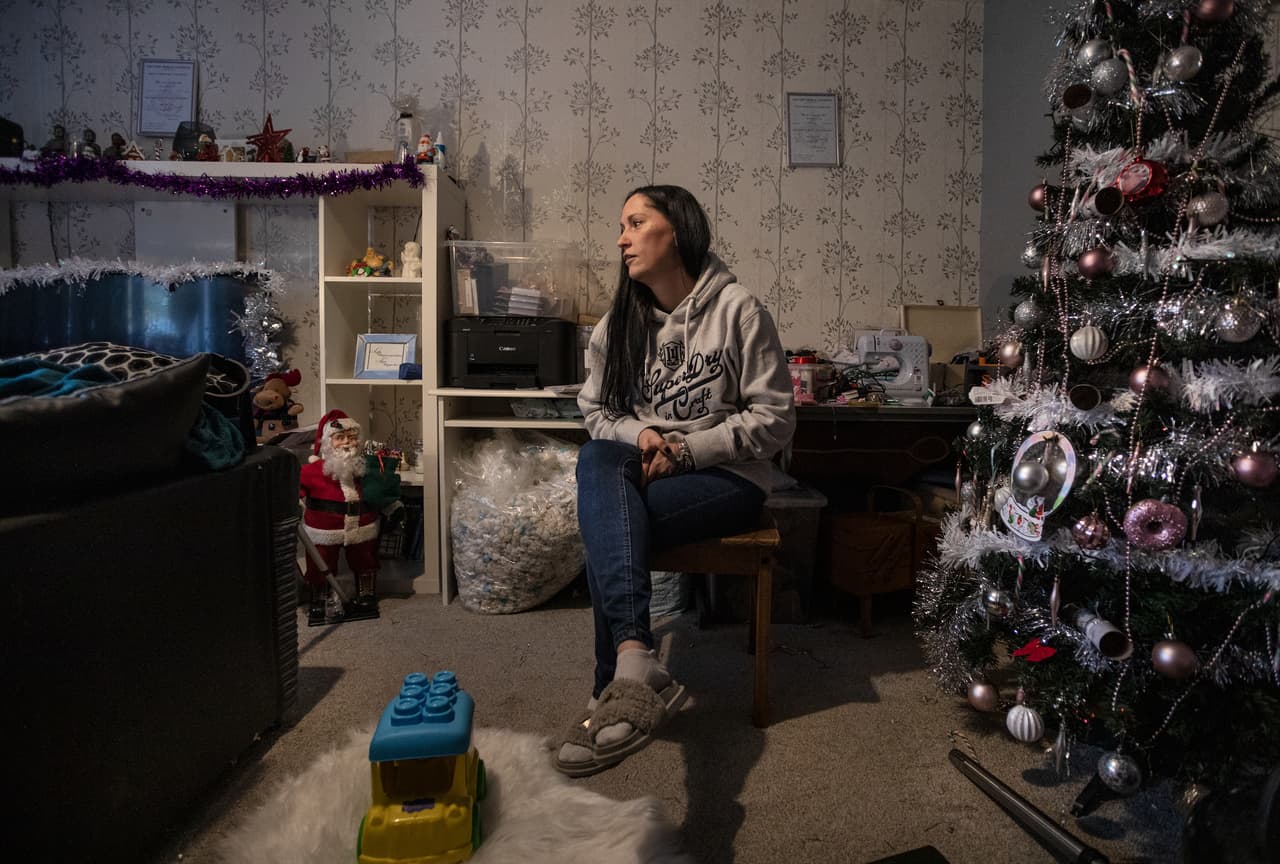
Since the Bureau contacted her energy supplier, Gemma has been given extra support to help manage her energy usage and a reduced repayment rate on her most recent interest-free energy loan.
During the first three months of this year, more than 364,000 electricity customers in Great Britain self-disconnected at least once for any length of time, and 320,000 did the same for gas. Not all of these will be due to lack of funds; some will have forgotten to top up, or failed to realise their credit was low.
However, for those with disabilities, the risk of fuel poverty leading to self-disconnection is much higher.
Research from the Joseph Rowntree Foundation has shown that the rate and risk of poverty has been consistently higher for disabled people during the past 20 years. The extra costs of equipment repairs, medical appointments or social care, combined with reduced access to employment and higher energy needs, puts greater financial and emotional pressures on to disabled people. They are also more likely to struggle with their household bills.
Energy companies are duty-bound to support consumers in vulnerable situations through their supply licence obligations and other legal requirements, such as the Equality Act 2010. However, despite this and renewed commitments from Ofgem to improve standards, the regulator has been unable to disclose how many people in fuel poverty have a disability or chronic illness that could be made worse by being cut off from energy.
The need to better shield disabled and vulnerable people from self-disconnection has been acknowledged for some time. In December 2020, Ofgem brought in new protections for vulnerable customers and extra obligations for energy providers. In September last year, the watchdog began to use its statutory powers to gather quarterly data from energy suppliers as part of their social obligations reporting on things like self-disconnections amongst smart prepayment customers and the number of those using their emergency credit facility. The Bureau requested this data from Ofgem via Freedom of Information requests.
However, though Ofgem could provide data up to June 2022, it could not cross-reference self-disconnections with a record of vulnerable customers, such as those on a priority services register (PSR), raising questions on how it monitors and holds energy suppliers to account.
The registers are free support services that ensure extra help is available from energy companies to customers in vulnerable situations. Someone’s eligibility is assessed on many factors, including their health, disabilities, communication needs and living conditions. It is just one tool for identifying vulnerability; Ofgem said that “the PSR captures non-financial rather than financial vulnerability”.
A total of 7.4 million electricity and 6.3 million gas customers in Great Britain were signed up to suppliers’ PSRs in 2021 – an increase of 5% and 6% respectively on the year before. However, simply being on a register will not prevent a vulnerable person from self-disconnecting.
When the Bureau challenged Ofgem on how it was monitoring the way companies protect vulnerable customers given the apparent absence of data, it referred to the standard of conduct for energy suppliers, which states that companies should “make an extra effort to identify and respond to the needs of those in vulnerable situations”. Ofgem later added: “We do not prescribe how suppliers should achieve this principle.”
Dan White, of the charity Disability Rights UK, told the Bureau: “With so many Disabled people disconnecting and putting their already fragile health at risk because of zero support, the time for companies, and indeed Ofgem, to get a grip on this situation is right now.
“The fact that we are talking about thousands of people – not hundreds – shows that existing support, such as the priority services register, is not fit for purpose. Humane action is needed now or lives will be lost.” As part of the newly launched Disability Poverty Campaign Group, the charity is campaigning for targeted support for disabled people’s energy costs.
Gathering accurate statistics on fuel poverty among vulnerable people is not straightforward, one industry body explained, partly because defining vulnerability is complicated and a person’s circumstances can change. Most energy companies the Bureau spoke to used Ofgem’s definition of vulnerability but it can be hard for energy suppliers to know the reason for a customer’s energy rationing. British Gas, for example, said it couldn’t assume why a customer might be topping up less often.
Despite this, the latest review of the market stated that all 17 suppliers surveyed by Ofgem needed to make improvements in how they identify, treat, and communicate with vulnerable customers. Two of those companies are not signatories to Energy UK’s Vulnerability Commitment.
National Energy Action (NEA), a charity that works with both Ofgem and suppliers, has warned that the government’s energy price guarantee is not enough to shield those already struggling from the impact of the 20% rise in the price cap taking effect on 1 January.
Its director of policy, Peter Smith, said: “The most vulnerable customers are being hit hardest during the energy crisis and despite several internal reviews by Ofgem on how they are being treated by suppliers, key gaps in the support they are receiving remain.”
He called for Ofgem to make energy suppliers’ social obligations data more transparent. “This data used to provide external agencies like NEA with vital insights, but the current data is being sat on by Ofgem and is no longer being provided in a periodic and timely way. This makes our work more challenging, and we are less able to raise awareness of current support in a more targeted way.”
For people with disabilities, the cost-of-living crisis has become an emergency with potentially fatal consequences.
Sulaiman Khan, 37, an ambassador for Muscular Dystrophy UK, relies on electrical medical equipment to move around his home and needs the heating on all year to prevent muscle pain. But he spoke to the Bureau from his bed, where he has been spending more time in order to minimise the costs from using his electric wheelchair.
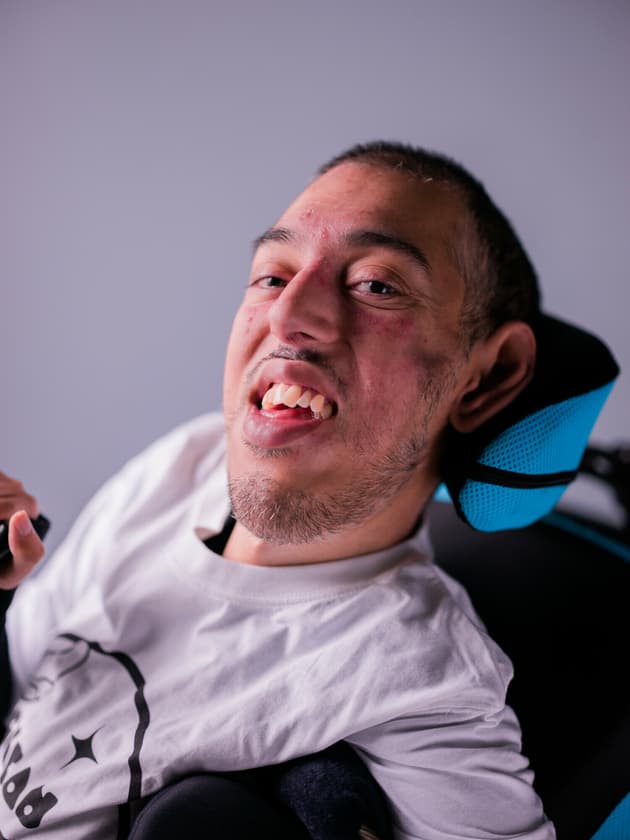 Sulaiman Khan relies on electrical medical equipment to move around his home
Chris O'Donovan, courtesy Muscular Dystrophy UK
Sulaiman Khan relies on electrical medical equipment to move around his home
Chris O'Donovan, courtesy Muscular Dystrophy UK
“The challenging thing is I have 24/7 care, so that’s five to six additional people using energy,” he said. “It’s really exhausting to be in bed. It’s not good for me to stay in one position all the time. I’m trying not to use the ventilator as much in the daytime – that’s not good for my health. I try to reduce the temperature in my room. Again, it’s hard to do that regularly.”
Sulaiman is still rationing his energy at a cost to his health. He said: “It’s challenging and there’s not enough support – not only for disabled people but particularly people with long-term conditions like myself. Twenty-two percent of the [UK] population is disabled but yet again, we’re left out of any solution or conversations.
“There’s a lot of shame and guilt around having to need or use all this equipment. I feel frustrated by it. [But] it helps me to live.”
All of the disabled people who spoke to the Bureau said they felt similarly ashamed, often simply for being in financial difficulty. Like Gemma, who used to work as a carer, some were professionals before their health problems worsened. But now they feel powerless and like many others, are dreading what is to come.
Muscular Dystrophy UK found that the cost of living crisis has left people affected by the condition facing increases of up to £450 a month on their utility bills. The charity has seen a surge in calls to its helpline about living costs and has urged for VAT to be removed from energy bills for anyone living with a chronic health condition.
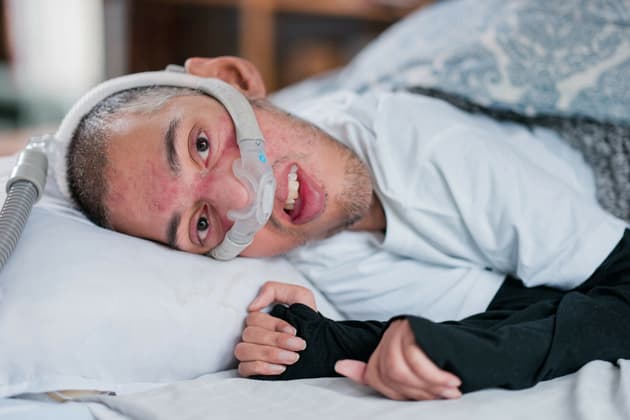 To cut down on costs Sulaiman has been spending more time in bed
Chris O'Donovan, courtesy Muscular Dystrophy UK
To cut down on costs Sulaiman has been spending more time in bed
Chris O'Donovan, courtesy Muscular Dystrophy UK
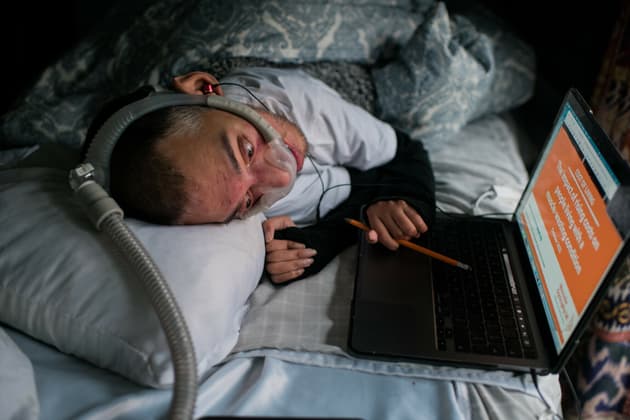 “It’s really exhausting to be in bed. It’s not good for me to stay in one position all the time”
Chris O'Donovan, courtesy Muscular Dystrophy UK
“It’s really exhausting to be in bed. It’s not good for me to stay in one position all the time”
Chris O'Donovan, courtesy Muscular Dystrophy UK
For those with terminal illnesses, the threat is even more acute. Even in summer, the cold can be a killer.
Marie Curie, the end-of-life charity, has contributed to the MP Alex Cunningham’s private member’s bill, which had its second reading in November. The bill would extend energy suppliers’ financial support schemes to people with a terminal illness and strengthen their employment rights.
Leah Steadman, research and policy manager at Marie Curie, said: “We know that many dying people will have gas and electric bills several thousands of pounds higher than the average home. Working-age people are among the most at risk and the government should give them early access to their state pension. With the hardest, coldest months of winter ahead, we’re saddened by the truth that, without intervention, cold homes will mean some people will die before their time.”
Sue Rogers, 64, pays more than £500 a month for her personal assistance plus about £100 for her energy bills via direct debit. Once her assistants leave, she turns off the heating, puts on layers of clothes and buries herself under a thick, winter duvet or an electric throw blanket. She often goes without energy for about 22 hours a day.
The sacrifices Sue faces as money gets tighter are having a devastating effect on her mental health. “The little thing that gives me joy every day is feeding the fox that I’ve befriended, that I’ve cared for for the last three years. It puts a smile on my face feeding him and feeding the birds – but bird food is expensive now.
“People will say, ‘Well, if you’re struggling, why not give up the birds?’ and I’m thinking, because I can’t just go for a walk in the park if I want to. I don't have that luxury.”
In her own words, Sue is mainly housebound and sometimes bedbound. “People sometimes just put everything down to ‘eating and heating’ but when you've got multiple disabilities, complex disabilities, it’s not as simple as that, and you’re stuck indoors. You have to make different choices all the time.”
Research from the charity Scope in February showed that half of the disabled people whose living costs had increased in the previous three months reported worsening mental health.
Sue’s mobility issues also leave her cut off from “warm banks” – public spaces for people unable to heat their homes. She and a neighbour with disabilities have been discussing spending time in each other’s homes to save on bills.
“There’s a lot of unknowns about how much worse it will get,” she said. “The government says, ‘We'll look after the most vulnerable’. But I don’t feel protected.”
Lead image: Gemma Carter with her daughter. Credit: Gavin Wallace for TBIJ
Reporter: Vicky Gayle
Data analysis and checking: Charles Boutaud
Additional reporting: Sarah Wilson
Bureau Local editor: Emily Wilson
Editor: Meirion Jones
Production: Frankie Goodway
Fact checkers: Alice Milliken, Charles Boutaud, Emiliano Mellino
Photography: Gavin Wallace; Chris O'Donovan
-
Area:
-
Subject:


